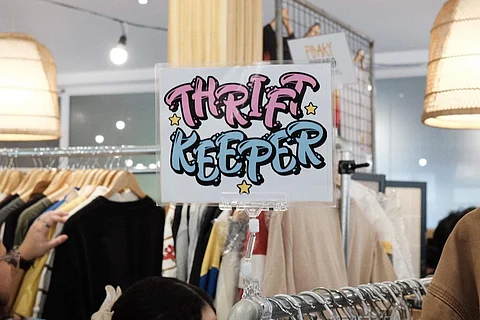

We visited Ukay Ta Bai on its second day, thinking all the good finds were gone from the racks and from the table displays. Yet, our visit proved us wrong. It became a surprising look into a growing Cebuano culture — one that actively supports a movement diametrically opposed to the fast fashion juggernaut. Here, the vision of slowing down rapid production is ambitious but not impossible. It was practically two days of sustainable consumption that can be positioned to become a lifelong goal.
Community
As soon as we arrived at 2 p.m., the designated opening time according to the organizers, we were greeted by long lines. Unity Cafe was spacious but the sheer number of people made it seem impossible for everyone to fit inside the venue.
The event’s conclusion witnessed an astounding 1,500-foot traffic — truly an insane number. In my mind, thrift shopping was always associated with a niche community, characterized by people searching for unique finds, sweating and enduring numb arms from carrying piles of clothes. Not for the faint-hearted for sure. However, the sheer volume of attendees painted a different picture entirely.
As time passed, the venue became increasingly packed. Upon entering, the scene became clear before us: Rubbing shoulders with fellow thrifters, amid a backdrop of bargaining and explaining. “Cool” doesn’t quite capture the atmosphere inside because it was more than that. Everyone seemed to have their eyes fixed on something; it almost felt like a crime to leave empty-handed.
Thrift shopping was traditionally viewed as a time-consuming activity. Yet, with the abundance of thrift displays that were available, you can easily locate that elusive item you’ve been seeking for months, making it a breeze to sort through the array of 500-plus options before you. Among the rack, you would go crazy checking out mini coquette dresses, retro band tees, white graphic tees, branded shoes, vintage sunglasses, windbreakers and more.
Indeed, it’s often said that young people have a penchant for secondhand items and embrace the principles of slow fashion. Despite the convenience of one-click shopping at online stores, the newfound joy of thrifting remains as an eco-conscious choice. These sentiments mirror the intentions of the organizers, highlighting their commitment to sustainability and mindful consumption.
Thrift finds
Our mission was clear: Find a good vintage cap. While many Ukay sellers offered their own collections, the first one we visited had exactly what we were looking for. For a reasonable P500, we snagged a blue corduroy cap from a vintage brand from a seller of Cebu Vintage Vibes booth.
We tried scoring for leather jackets, but unfortunately, none fit me perfectly. However, with prices ranging from P600 to P1,000, there were plenty of other great vintage pieces to choose from. The Carhartt items were particularly tempting, but none looked quite right when my boyfriend tried them on. It was disappointing to see coveted brands all in one place yet not find the perfect match. Still, what didn’t work for us might be just right for someone else and that’s exactly what the joy of thrifting is.
The Ukay Ta Bai organizers meticulously arranged 26 vendor booths. Two days seemed insufficient to showcase their best pieces, as many eager shoppers were left wanting more. Nevertheless, the event was a promising display of effective branding and a steadfast vision that remained true to their initial goals. It was a resounding success, marked by a feisty intergenerational gathering of influencers, artists, locals and thrift businesses.
Sustainability
When you first start thrifting, the goal might simply be to find cheap clothes. But as you get more hooked into the world of thrifting, your perspective shifts. You start looking for quality pieces that you can customize to suit your style or, perhaps, you come across rare finds like Levi’s denim jeans. The thrill of discovering these hot-ticket items from your favorite designers is truly unmatched, making thrifting the perfect way to repurpose and give new life to clothing.
After this comes the realization that by doing thrifting, you contribute more. Not only are you reducing your environmental footprint, but you’re also taking a bold stance against the temptation to purchase mass-produced clothes from mainstream brands. The vintage vibes and Y2K fashion prevalent in thrift culture certainly play a role, but ultimately, it’s about making eco-conscious choices that have never been easier or more affordable.
The organizers of Ukay Ta Bai have declared this event as the first of many to come, marking the beginning of a new community culture in Cebu. Willow Hoods, alongside Rizzan and Gerard, poured their hearts and souls into making it a reality. The thrift sellers who participated also played a crucial role in bringing the event to life. Ukay Ta Bai is an intersection of two important principles: reducing waste and encouraging people to buy less but better. Each person in the room in those two days left a trail of hope for a thriving thrift culture and a planet that thrives alongside it.